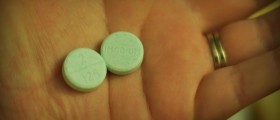
Some people can get used to the effect of laxatives and continue using these medications even when their bowel movement has normalized. Then, they may face a risk of suffering from some of many side effects of this type of medication, although research indicates that Movicol is safe even when used long-term (for up to two years). However, consulting a doctor is wise if you find yourself relying on a laxative like Movicol for longer periods of time, and in the case of children, pediatricians or family doctors should always be consulted.
Movicol is a very efficient laxative
The effect of Movicol — producing a successful bowel movement — may take less than 24 hours, but it isn't unusual to have to wait a day or two, and that shouldn't be a cause for concern.
Movicol should be used as directed on the package insert, which you should definitely read, in order to avoid side effects, which are certainly possible. The side effects of Movicol are not typically serious and they do not require medical attention, but if they appear, it is necessary to stop with the use of this medication right away.
Despite the fact that the laxative Movicol does not cause serious side effects and it is available freely over the counter, if it was prescription-only, not all patients would be prescribed Movicol and there is a good reason for that. For example, the symptoms of a heart disease can be seriously aggravated if this medication is used. Thus, if you have a heart condition, consult your doctor before using Movicol.
Also, patients who have a history of ulcerative colitis, Crohn’s disease, intestinal obstruction or perforation, or a history of some other intestinal condition, would also not be prescribed Movicol. Pregnant women should consult a doctor before using Movicol, while this laxative seems to be safe for brastfeeding mothers, its manunfacturers report.
When using Movicol, you may wonder if you should avoid mixing it with other medications, since these might nullify its effect. Other medications should be used at least an hour before or after Movicol is taken, due to the fact that they may not be absorbed well, once Movicol flushes the intestinal tract. You can, however, take it with or without meals, at any time of the day.
If laxatives are abused, there are side effects
As far as Movicol is concerned, the most common side effects of this medication are excessive thirst, headache, feelings of fatigue and breathlessness. Swollen ankles may appear as well. In some cases, vomiting, diarrhea, abdominal pain, bloating, and nausea can be possible side effects too. If you experience these side effects, reducing your dose may send them packing — but if they persist, stop taking Movicol for now, and talk to your doctor.
In general, possible complications of laxative abuse are numerous and include bloating and pain, bleeding, abnormal electrolyte levels (which is avoided with Movicol specifically, since it includes electrolytes), gastrointestinal problems like gastritis, gastric bleeding and ulcers, edema, dehydration, esophagitis.
In case a person has hemorrhoids, they may become irritated by laxative use or abuse.
Laxative abuse may cause difficulties in absorbing important nutrients as well as medications and this situation can be very dangerous. Also, abusing laxatives may lead to liver damage, irritable bowel syndrome, pancreatitis, damage to the esophagus, metabolic problems and weight loss.
Paradoxically, the excessive use of laxatives may cause constipation too. This happens because laxatives lead to dehydration and constipation leads to the need to use more laxatives, creating a vicious circle that is hard to break. If a person develops a laxative addiction, the first thing to do is to stop taking them immediately.
Steps you can take to avoid the need for laxatives include:
- Physical activity helps to regulate bowel movements. This does not have to mean exercising excessively; moderate activities like walking, dancing, gardening or sailing will very often do the trick and get you to the bathroom.
- Making changes in your diet is essential for solving problems with constipation without the use of laxatives. Diets should be rich in foods that contain lots of fiber, like fresh fruit and vegetables and whole grain cereals and bread. It is important to take enough water because fiber needs to loosen the stool.
- You also need to stay hydrated well to have regular bowel movements, so consider whether you need to add more water to your daily routine.
The folks over at Movicol themselves recommend taking all these steps before you resort to using one of their products.
Quitting laxatives may lead to some symptoms of withdrawal, just like any other addiction, leading to bloating, water retention, constipation and weight gain. In most cases, these side effects, weight gain included, last for only a few weeks.
To sum it all up, Movicol and other laxatives can be very useful if you are suffering from constipation that cannot adequately be relieved with lifestyle changes. However, once the constipation is gone, you should stop taking these medications. Any prolonged use of laxative can prove to be counter-productive, leading to various health issues and side effects, so if you feel yourself taking Movicol or any other laxative very often, discuss other potential solutions with your doctor. Moreover, once you stop taking laxatives, your body may enter a stage of withdrawal, triggering more health issues.

















Your thoughts on this
Loading...